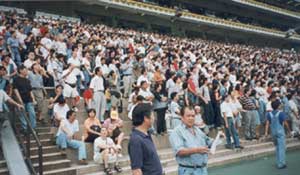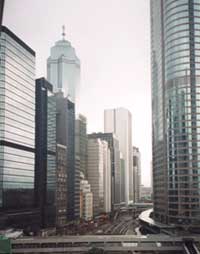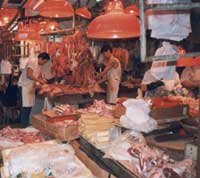|
Asia's hurting hub
|
 |
October 2, 1998: 12:06 p.m. ET
As morale plunges with realty prices, HK has more than Hang Seng trouble
|
HONG KONG (CNNfn) -- The thoroughbreds are racing again in this gambling-mad metropolis, and to herald the new season in style, the Hong Kong Jockey Club invited pop star Andy Lau to croon for the 60,000 bettors packed into the stands at Sha Tin racetrack.
With Hong Kong Chief Executive Tung Chee Hwa and a slew of other dignitaries looking on, Lau sang a popular favorite: "The Good Times."
Good times?
That would seem a cheeky choice in a city where the unemployment rate is at a 15-year high of 4.8 percent and climbing higher, and the economy shrank 5 percent in the second quarter -- officially putting Hong Kong in a recession.

Lots of fans, but relatively poor betting volume, at Sha Tin racetrack
Investors on the verge of nervous breakdowns have swamped charities and suicide hot lines with phone calls. And that's not to mention countless other cash-strapped souls too ashamed, or shy, to speak up.
A local union disclosed in early September that it had received 662 phone calls so far this year from workers worried about their pay and benefits.
The Clothing, Industry, Clerical and Retail Trade Employees General Union said employers have threatened 90 percent of its members with pay cuts ranging from 7 to 32 percent.
"Usually, the workers are too worried about not being able to find another job, so they agree to the employers' requests," Union spokeswoman Cheung Lai-ha told the South China Morning Post.
The first race day of the new season at Sha Tin, in Hong Kong's once-flourishing New Territories, offered little reprieve from the city's sorry litany.
First, an equestrian acrobat from Mongolia flew headlong from his saddle when his overzealous horse crashed into a barricade, then the power went out -- rendering the raceway's state-of-the-art electronic scoreboard useless.
Even the gambling-crazed Chinese, who formerly took bets on candidates for the Imperial Civil Service Administration, lost some of their stomach for their favorite pastime. Raceday betting volume totaled a relatively paltry HK$931 million (US$120.2 million).
"I used to bet HK$1,000 (US$129), but now I can afford only HK$100 (US$12.90)," said one sturdy old man in a tank top.
Image of splendor and opulence
Such belt-tightening is at sharp odds with the image of Hong Kong as Asia's frenetic commercial hub, an urban maelstrom whose 6.1 million residents turned a barely inhabitable rock into an obligatory port of call for would-be movers and shakers.

Glitter and bustle belie problems
The dour mood also clashes with Hong Kong's outward splendor and opulence. Hong Kong's glittering skyline, viewed across Victoria Harbor from Kowloon, is an architectural pastiche of mirror-glass facades, giant cross-girders, potholed windows, gilded rooftops and pastel high-rises. Cranes jut from spiky towers like jagged chopsticks.
In the morning, when the mist rises over the surrounding peaks like a theater's curtain, setting the skyline ablaze in sunlight, the effect is breathtaking.
But beneath the patina of glitter, lies an economy in deep distress. That may not be apparent, however, from the pulsating energy of Hong Kong life at ground level, where sparkling shopping centers alternate with streetside stalls hawking everything from herbal medicines and acupuncture to parakeets and flip-flops.

The butchers still hack away
To boost confidence in the local economy, a group of local tycoons is even planning a feel-good festival to help perk up a gloomy populace.
The sense of unity has been severely tested of late. Barely a day goes by here without someone invoking another Hong Kong hex.
Not even Suzie Wong would feel welcome here any more. The mama-sans in Hong Kong's famed red light district of Wan Chai have fallen on hard times, with few tourists, or natives, harking to their sales pitch of sultry maidens. And that was before Moody's put the city's credit rating on a downgrade watch.
Amid the economic doldrums, Hong Kongers have remained wedded to their high-tech ways. With its fully computerized ticketing machines and spotless marble floors, the Mass Transit Railway Corp. that links Hong Kong's main island to Kowloon and the New Territories would put most European capitals to shame.
At rush hour, the din of beeping cell phones is palpable in Central, Hong Kong's bustling downtown financial district.
And on any weekday, hordes of anxious stock owners on their lunch hour converge on banks and interactive computer centers, where Internet providers display the Hang Seng index in real time.
In Hong Kong, an estimated 15 percent of residents own stock assets -- well below the roughly 50 percent in the United States. But Hong Kongers share the stock obsession with their American counterparts -- along with a hidebound habit of sticking with the market even when the going gets tough.
As the Hang Seng tanked from a high of 16,000 last year to 6,600 recently, many investors caught in the downdrift felt short-changed.
Sticking with the Hang Seng
But most Hong Kongers, rather than abandoning the market at its bottom, have stayed the course, hoping for a rebound. The government, meanwhile, has maintained interest rates at a high level as it has endeavored to keep the territory's currency pegged tightly to the U.S. dollar.
One upshot, as economists here point out at every turn, are relatively higher mortgages for property owners whose holdings have lost as much as 40 percent of their value in a year. According to one recent estimate, the sharp erosion in stock market and property values has shaved $4 trillion from Hong Kong's assets.
The economic tailspin has created some surprising opportunities for insurance brokers. For instance, Aetna's East Asia Insurance Group has expanded its staff by around 185 percent this year to 2,000 agents -- and plans further growth.
The downturn has spawned other signs of distress as households feel the money pinch. For years, well-heeled Hong Kong families have employed young Filipino women as maids and nannies.
Partly as a result of the exodus of many expatriates since Hong Kong's handover to China last year, the market for those maids has begun to dry up.
And then there are the ubiquitous fortunetellers, mostly wizened old men crouched on street corners amid a fragrant array of joss sticks and snake oils, proferring prophesies on the cheap. These cut-rate soothsayers are among the few entrepreneurs still doing a booming business.
Of course, one local notes that a positive reading costs more than a negative one -- after all, good news takes longer to divine these days in Hong Kong.
-- story and photos by staff writer Douglas Herbert
|
|
|
|
|
 |

|

